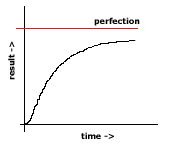 If you spend any time at all reading this blog (of course you do..) then you’ll know that I have a recurring theme about perfection, ideas, freedom and “justdoit-ness”. I sum it all up on a previous post where I talk about my OPG – Overactive Perfection Gene – which works hard to prevent me from doing stuff rather than just thinking and talking about it. On the left is the “time vs perfection” graph I chucked into that post.
If you spend any time at all reading this blog (of course you do..) then you’ll know that I have a recurring theme about perfection, ideas, freedom and “justdoit-ness”. I sum it all up on a previous post where I talk about my OPG – Overactive Perfection Gene – which works hard to prevent me from doing stuff rather than just thinking and talking about it. On the left is the “time vs perfection” graph I chucked into that post.
Yesterday there was a superb programme on Radio 4’s “In Our Time” about Newton’s Principia and the Laws of Motion, and about the philosophical as well as physical meaning behind these axioms. It’s well worth a listen. I’m not sure if this is the direct link but it’s somewhere round there…
I’m a geophysicist by training (don’t tell anyone) and so the three laws aren’t new to me, and probably aren’t to you either. What struck me about this programme in particular however was the last five minutes where the guests began to focus in the apparent displacement of Newton’s laws by Einstein a couple of hundred years later. Einstein showed that the Newtonian model of the world was simplistic, that the laws of motion hid something deeper and darker: mass-energy equivalence being the most striking example.
It appears (as far as we can tell right now..) that Einstein is “right”. But like A-level students completing our exams, going to university and then discovering that actually what we’d spent years learning was all an approximation, one of the first questions we naturally ask is “does it actually matter?”.
It would appear not, for the most part. Einstein’s brilliance – his “rightness” – matters a huge amount when we’re nearing the speed of light. But down here as we plod about our normal daily lives, we can cope with the innacuracies. Relativity matters not a jot; actions do have an equal and opposite reaction; gravity acts downwards and relativity is merely a philosophy. As Melvin Bragg said on the program:
“…we didn’t need Einstein to put Armstrong on the moon“
Like some bad vicar trying desperately hard to relate OK magazine with a verse from the bible, it’s time for me to get to the point. It is this: just as we accept Newton over Einstein even though we know he is essentially “wrong”, if we (and by this I mean me, museums or anyone with ideas) want to shine, we too need to accept imperfection. In fact, I believe we need to learn to actively embrace it. Again calling back to the programme: a mechanistic universe is not by any definition a deterministic one: if we worry and continue to worry about the “what if’s” then we will never grow.
I’m of course always prompted by the discussions around Web2 and museums, which flared again last week on the MCG mailing list (#34). As Nick Poole pointed out, we do have a tendancy to take to our corners and thus risk polarisation, but essentially it boils down to “we should think more” vs “we should do more”.
One of the other speakers on the Radio 4 programme came out with this, which really resonates with me:
“the perfect truth is perhaps not to be had, and certainly isn’t necessary for startling and brilliant success“
If we can learn to accept a level of chaos, embrace the prevailing direction of travel without actually knowing where we are going to end up, then we stand a chance of actually getting somewhere. If we carry on worrying, we’re going nowhere but backwards…
Hi Mike —
Fantastic post, appealing to both the historian of science in me and the digital humanist. And spot on at that. For the past six years or so, our unofficial motto at the Cetner for History and New Media has been “the perfect is the enemy of the good” (after Voltaire, Clausewitz, et al.)
Tom
Thanks Tom! The programme is well worth a listen – inspiring stuff
Mike
Hi Mike,
have you read any Kant? “One can never know the Thing in itself (Ding an sich).” Made me feel comfortable with imperfection.
Great talk yesterday.
J.